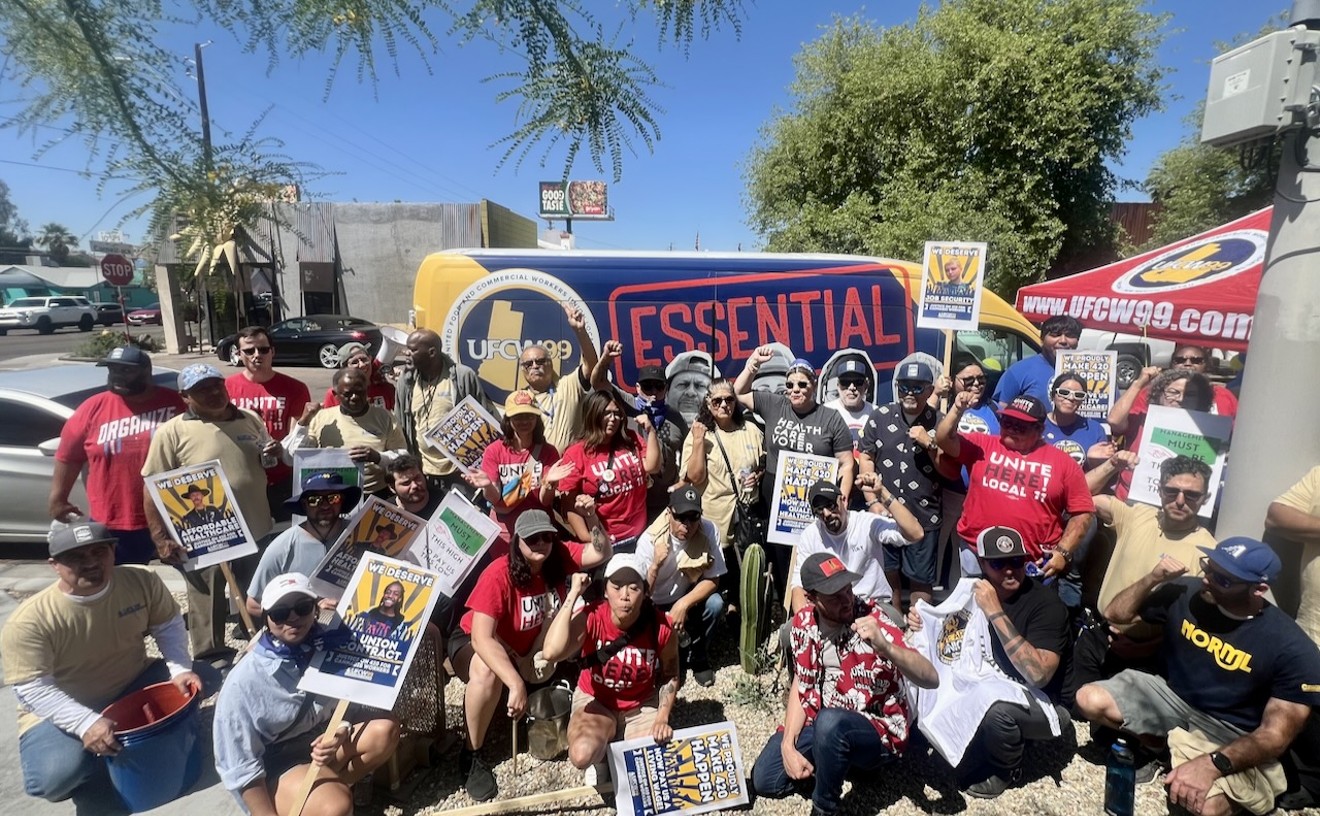That was the underlying theme of hours of questioning by Stanley Young, one of the lawyers who represents Hispanics suing the county in a major racial-profiling case that continued today. As the advocate for the Hispanic plaintiffs in the case, Young did an impressive job using Arpaio's past statements, speeches and news releases to make the sheriff look like a racist.
Tim Casey, Arpaio's attorney, stole some of Young's wind during cross examination, allowing Arpaio to impress on U.S. District Judge G. Murray Snow that reasonable explanations existed for many of Arpaio's outrageous quotes and antics.
The main question after today's testimony was whether Snow, the final arbiter in the jury-less trial, will perceive a strong link between Arpaio's bluster about illegal immigrants and how his deputies treated Hispanics.
Many details from the trial that began last week have been examined piecemeal by the public since the legal immigrant Ortega Melendres first launched his lawsuit in December 2007. But when these examples were placed back-to-back today by Young, Arpaio had to feel bludgeoned.
| Stanley Young |
We related some of these examples in this morning's blog post. Some of the most damning anecdotes by Young came from the collection of bigoted letters that Arpaio kept in his "illegal immigration" file.
Time and time again, Arpaio would receive a letter from someone railing against "Mexicans" standing on street corners or speaking Spanish, and Arpaio would highlight what would appear to be the most bigoted portions of the letter just before distributing it to his staff or asking his secretary to write a thank-you letter to the sender. Close observers of Arpaio's office would have recognized many of Young's examples from both news articles and the allegations levied against Arpaio's office in December by the U.S. Justice Department.
Some of the letters that Arpaio forwarded to underlings were accompanied by brief, scribbled notes that encouraged some action, such as "handle this."
Arpaio swore that the notes didn't really mean anything, that he never followed up on his suggestions, and that his staff took care of all that nitty-gritty enforcement detail.
"When I sent those letters, it doesn't mean that I agree with them, or mean [MCSO employees] should take action," Arpaio said.
Still, the number of bigoted letters in which Arpaio sent the authors thank-you letters was staggering. He thanked a woman for telling him that "swarms" of Mexicans had approached the woman's car, thanked another writer who warned that "anglos" were in danger of losing their way of life.
In several Perry Mason moments, Arpaio denied that he said or did something, only to caught in traps by Young, who played videotapes of depositions and news conferences or presented Arpaio with his own previous statements. For instance, Young asked Arpaio if his policy was to go after illegal immigrants first, and their crimes second.
"That is not correct," Arpaio answered, his voice sounding tired. As he'd done during his testimony at the disciplinary hearings of former County Attorney Andrew Thomas, Arpaio claimed he had the flu.
Young then played the video from a news conference in which Arpaio states bluntly that he has a "pure" program that targets illegal immigrants and "not the crime first."
Arpaio said he was referring to the fact that, at the time, his deputies were cross-trained as immigration officers under the federal 287(g) program and could target immigrants even if they weren't connected with any state crime. The explanation didn't really help his case, though, if the object is to convince Murray that he's not discriminating.
Young moved so fast through his examples that he didn't always stop to check Arpaio's BS. At one point, he asked Arpaio whether he's called illegal immigrants "dirty." The sheriff admitted it was true but maintained the adjective was in context -- he'd been speaking about how Mexicans who have crossed the desert may be "heated," disheveled, and "dirty after four days in the desert."
However, Arpaio used the term in a different context during a 2009 interview with GQ magazine: "All these people that come over, they could come with disease. There's no control, no health checks, or anything. They check fruits and vegetables. How come they don't check people? No one talks about that! They're all dirty."
Young asked Arpaio if he believes it's possible to spot an illegal immigrant "if they look like they're from another country."
"No," Arpaio said flatly.
Young then played an excerpt from an interview with Glen Beck in which Arpaio said just that. Even Beck told him "that sounds like profiling," and Arpaio answered [in the video interview] that a 1996 law gives him the right to target people based on how they look.
"You think that someone without identification who looks like they just came from Mexico is an illegal immigrant?" Young asked.
"No," said Arpaio.
And Young played another tape that proved Arpaio wrong.
On a couple of occasions, Arpaio seemed to admit his darker side. When Young asked him whether he'd ever encouraged his anti-illegal-immigrant investigators to check out a bunch of Caucasians selling food without a permit, as he'd done with allegations that "Mexicans" were doing the same thing, Arpaio confessed that targeting Caucasians that way wouldn't have occurred to him because the scenario would not have been in the context of illegal immigration.
The sheriff admitted that he never sent the letter-writers anything that corrected them or chided them for their bigotry -- for instance, he never wrote back that speaking Spanish or being Mexican was not a crime.
Young asked him if sending such corrections might have been in the public good -- and Arpaio acknowledged that Young had a point.
In another "gotcha" moment that had to have gotten under the judge's skin, Young played a tape from a 2009 speech Arpaio gave in Texas in which he said he has "official reasons" for doing things -- for lawsuits and such -- and then he has "my reasons."
Arpaio explained that he sometimes "throws humor into my speeches" and that the statement wasn't true. This prompted Young to hit Arpaio with several "which is true" questions: Were his comments in his books, speeches, and news conferences true, or what he testified to in the courtroom?
Courtroom, Arpaio answered. But, by then, what was left of his credibility had been pretty much destroyed.
Tim Casey's questioning of his client wasn't nearly as exciting, as could be expected, but Casey did cast doubt on whether the bigoted letters really prompted many of Arpaio's immigrant roundups, which Arpaio calls "crime-suppression sweeps." Clearly, some of the letters preceded the sweeps, but Casey argued that at least one sweep occurred the day after a letter had been received by Arpaio asking for enforcement action against Mexicans. Clearly, the sweeps -- which involve dozens of deputies -- had to take more than a day to plan. Arpaio said they typically took three-to-four weeks to schedule.
Casey also got Arpaio to repeat several times that the letters did not influence his operations in any way, that when he referred to the appearance of illegal immigrants, he merely was echoing standard criteria that federal authorities use during their own immigration enforcement.
Tomorrow, Deputy Brett "Shut Up!" Palmer is expected to take the witness stand. The trial is scheduled to run through August 2.
But don't expect fireworks at the end of this one. The plaintiffs are asking for Arpaio to make changes to his office that would prevent racial profiling in the future -- they're not asking for monetary damages.
If Arpaio manages to win re-election this November, the hope is that he'll be so tired of being portrayed as a racist that he'll stop acting like one.











